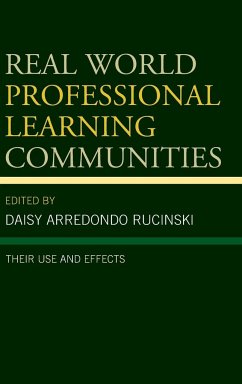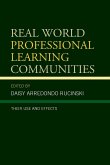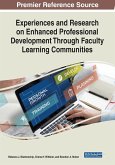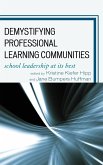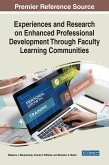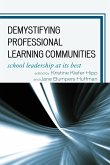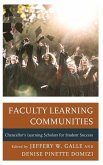- Gebundenes Buch
- Merkliste
- Auf die Merkliste
- Bewerten Bewerten
- Teilen
- Produkt teilen
- Produkterinnerung
- Produkterinnerung
In a professional learning community, teachers are organized into teams, committed to meeting on a regular basis to study their teaching strategies and the effects of those strategies on the students in their classrooms. Whatever the organizational structure, the teams have one goal, that is to improve teaching so that student learning is improved.
Andere Kunden interessierten sich auch für
![Real World Professional Learning Communities Real World Professional Learning Communities]() Daisy Arredondo RucinskiReal World Professional Learning Communities51,99 €
Daisy Arredondo RucinskiReal World Professional Learning Communities51,99 €![Professional Learning Communities Professional Learning Communities]() Barbara D. CulpProfessional Learning Communities71,99 €
Barbara D. CulpProfessional Learning Communities71,99 €![Experiences and Research on Enhanced Professional Development Through Faculty Learning Communities Experiences and Research on Enhanced Professional Development Through Faculty Learning Communities]() Experiences and Research on Enhanced Professional Development Through Faculty Learning Communities175,99 €
Experiences and Research on Enhanced Professional Development Through Faculty Learning Communities175,99 €![Demystifying Professional Learning Communities Demystifying Professional Learning Communities]() Demystifying Professional Learning Communities178,99 €
Demystifying Professional Learning Communities178,99 €![Experiences and Research on Enhanced Professional Development Through Faculty Learning Communities Experiences and Research on Enhanced Professional Development Through Faculty Learning Communities]() Experiences and Research on Enhanced Professional Development Through Faculty Learning Communities227,99 €
Experiences and Research on Enhanced Professional Development Through Faculty Learning Communities227,99 €![Demystifying Professional Learning Communities Demystifying Professional Learning Communities]() Demystifying Professional Learning Communities69,99 €
Demystifying Professional Learning Communities69,99 €![Faculty Learning Communities Faculty Learning Communities]() Faculty Learning Communities114,99 €
Faculty Learning Communities114,99 €-
-
-
In a professional learning community, teachers are organized into teams, committed to meeting on a regular basis to study their teaching strategies and the effects of those strategies on the students in their classrooms. Whatever the organizational structure, the teams have one goal, that is to improve teaching so that student learning is improved.
Hinweis: Dieser Artikel kann nur an eine deutsche Lieferadresse ausgeliefert werden.
Hinweis: Dieser Artikel kann nur an eine deutsche Lieferadresse ausgeliefert werden.
Produktdetails
- Produktdetails
- Verlag: Rowman & Littlefield Publishers
- Seitenzahl: 230
- Erscheinungstermin: 8. Dezember 2016
- Englisch
- Abmessung: 235mm x 157mm x 18mm
- Gewicht: 530g
- ISBN-13: 9781475822809
- ISBN-10: 1475822804
- Artikelnr.: 45470574
- Herstellerkennzeichnung
- Libri GmbH
- Europaallee 1
- 36244 Bad Hersfeld
- gpsr@libri.de
- Verlag: Rowman & Littlefield Publishers
- Seitenzahl: 230
- Erscheinungstermin: 8. Dezember 2016
- Englisch
- Abmessung: 235mm x 157mm x 18mm
- Gewicht: 530g
- ISBN-13: 9781475822809
- ISBN-10: 1475822804
- Artikelnr.: 45470574
- Herstellerkennzeichnung
- Libri GmbH
- Europaallee 1
- 36244 Bad Hersfeld
- gpsr@libri.de
By Daisy Arredondo Rucinski
Foreword-Terri Croft Boman Part I -Overview of book Chapter 1: Introduction
Chapter 2: The Conceptual framework for Professional Learning Communities
as Reform Initiatives Daisy Arredondo Rucinski (Example of use by Kyra L.
Rhyne) Part II - Use of PLCs in Elementary Schools Chapter 3: Teacher
reflection and teacher development in elementary schools using Alabama's
Instructional Partners Program (IPN) Bradley A. Scott, Principal, Chaffee
Elementary School, Huntsville, AL Chapter 4: Elementary teacher reflection
in professional learning communities and teacher learning Rachel Real
Poovey - Supervisor of Elementary Education, Decatur, AL City Schools
Chapter 5: Using PLC collaboration as a foundation for trust and teacher
efficacy in elementary schools Datie I. Priest - Principal, West Decatur
Elementary School, Decatur, AL Part III - Use of PLCs in middle and high
schools Chapter 6: Relationships among professional learning communities,
trust, and student achievement in elementary and middle school mathematics.
Herbert A. Betts III - Madras Middle School, Assistant Principal, Coweta
School System, Newnan, GA Chapter 7: School Culture, Professional Learning
Community and Student Achievement in Middle and High Schools Amanda Hitson
Cassity - District curriculum director, Northern Region, Tuscaloosa County
Schools, Tuscaloosa, AL Chapter 8: Common Planning in High School
Departments: A Structure for Implementing Professional Learning Communities
Kyra L. Rhyne - District coordinator for virtual learning, Catoosa County
Schools, Ringold, GA Part IV - School, District, and State contexts in
using PLCs as a school reform and accountability strategy: Chapter 9: Using
a professional learning community framework to support response to
intervention (RTI) in middle and high schools Nicole Spiller - District
Director of Student and Intervention Services, Atlanta School System,
Atlanta, GA Chapter 10: Developing schools as professional learning
communities: Does district level leadership matter? Terri Croft Boman -
University - K-12 Professional Development Director Chapter 11:
Professional development in the states: How statutes and regulations target
teacher quality to improve student learning Helen M. Hazi, Professor, West
Virginia University and Daisy Arredondo Rucinski - Professor, The
University of Alabama Part V - What the research says about the effects of
using PLCs in schools and student or teacher learning: Chapter 12: Meta
analyses of the research Part 1: A meta-analytic review of dissertation
research on Use of PLCs and student achievement Part 2: A Meta-analytic
Review of the Published Research on Use of PLCs and Student and Teacher
Learning. Susan McClendon Patrick, Secondary Curriculum Supervisor, Cullman
County Schools, Cullman, AL; Daisy Arredondo Rucinski, Professor; and Sara
Elizabeth Tomek, Associate Professor, UA. Chapter 13: Conclusions,
limitations, and implications for future research Daisy Arredondo Rucinski
Index
Chapter 2: The Conceptual framework for Professional Learning Communities
as Reform Initiatives Daisy Arredondo Rucinski (Example of use by Kyra L.
Rhyne) Part II - Use of PLCs in Elementary Schools Chapter 3: Teacher
reflection and teacher development in elementary schools using Alabama's
Instructional Partners Program (IPN) Bradley A. Scott, Principal, Chaffee
Elementary School, Huntsville, AL Chapter 4: Elementary teacher reflection
in professional learning communities and teacher learning Rachel Real
Poovey - Supervisor of Elementary Education, Decatur, AL City Schools
Chapter 5: Using PLC collaboration as a foundation for trust and teacher
efficacy in elementary schools Datie I. Priest - Principal, West Decatur
Elementary School, Decatur, AL Part III - Use of PLCs in middle and high
schools Chapter 6: Relationships among professional learning communities,
trust, and student achievement in elementary and middle school mathematics.
Herbert A. Betts III - Madras Middle School, Assistant Principal, Coweta
School System, Newnan, GA Chapter 7: School Culture, Professional Learning
Community and Student Achievement in Middle and High Schools Amanda Hitson
Cassity - District curriculum director, Northern Region, Tuscaloosa County
Schools, Tuscaloosa, AL Chapter 8: Common Planning in High School
Departments: A Structure for Implementing Professional Learning Communities
Kyra L. Rhyne - District coordinator for virtual learning, Catoosa County
Schools, Ringold, GA Part IV - School, District, and State contexts in
using PLCs as a school reform and accountability strategy: Chapter 9: Using
a professional learning community framework to support response to
intervention (RTI) in middle and high schools Nicole Spiller - District
Director of Student and Intervention Services, Atlanta School System,
Atlanta, GA Chapter 10: Developing schools as professional learning
communities: Does district level leadership matter? Terri Croft Boman -
University - K-12 Professional Development Director Chapter 11:
Professional development in the states: How statutes and regulations target
teacher quality to improve student learning Helen M. Hazi, Professor, West
Virginia University and Daisy Arredondo Rucinski - Professor, The
University of Alabama Part V - What the research says about the effects of
using PLCs in schools and student or teacher learning: Chapter 12: Meta
analyses of the research Part 1: A meta-analytic review of dissertation
research on Use of PLCs and student achievement Part 2: A Meta-analytic
Review of the Published Research on Use of PLCs and Student and Teacher
Learning. Susan McClendon Patrick, Secondary Curriculum Supervisor, Cullman
County Schools, Cullman, AL; Daisy Arredondo Rucinski, Professor; and Sara
Elizabeth Tomek, Associate Professor, UA. Chapter 13: Conclusions,
limitations, and implications for future research Daisy Arredondo Rucinski
Index
Foreword-Terri Croft Boman Part I -Overview of book Chapter 1: Introduction
Chapter 2: The Conceptual framework for Professional Learning Communities
as Reform Initiatives Daisy Arredondo Rucinski (Example of use by Kyra L.
Rhyne) Part II - Use of PLCs in Elementary Schools Chapter 3: Teacher
reflection and teacher development in elementary schools using Alabama's
Instructional Partners Program (IPN) Bradley A. Scott, Principal, Chaffee
Elementary School, Huntsville, AL Chapter 4: Elementary teacher reflection
in professional learning communities and teacher learning Rachel Real
Poovey - Supervisor of Elementary Education, Decatur, AL City Schools
Chapter 5: Using PLC collaboration as a foundation for trust and teacher
efficacy in elementary schools Datie I. Priest - Principal, West Decatur
Elementary School, Decatur, AL Part III - Use of PLCs in middle and high
schools Chapter 6: Relationships among professional learning communities,
trust, and student achievement in elementary and middle school mathematics.
Herbert A. Betts III - Madras Middle School, Assistant Principal, Coweta
School System, Newnan, GA Chapter 7: School Culture, Professional Learning
Community and Student Achievement in Middle and High Schools Amanda Hitson
Cassity - District curriculum director, Northern Region, Tuscaloosa County
Schools, Tuscaloosa, AL Chapter 8: Common Planning in High School
Departments: A Structure for Implementing Professional Learning Communities
Kyra L. Rhyne - District coordinator for virtual learning, Catoosa County
Schools, Ringold, GA Part IV - School, District, and State contexts in
using PLCs as a school reform and accountability strategy: Chapter 9: Using
a professional learning community framework to support response to
intervention (RTI) in middle and high schools Nicole Spiller - District
Director of Student and Intervention Services, Atlanta School System,
Atlanta, GA Chapter 10: Developing schools as professional learning
communities: Does district level leadership matter? Terri Croft Boman -
University - K-12 Professional Development Director Chapter 11:
Professional development in the states: How statutes and regulations target
teacher quality to improve student learning Helen M. Hazi, Professor, West
Virginia University and Daisy Arredondo Rucinski - Professor, The
University of Alabama Part V - What the research says about the effects of
using PLCs in schools and student or teacher learning: Chapter 12: Meta
analyses of the research Part 1: A meta-analytic review of dissertation
research on Use of PLCs and student achievement Part 2: A Meta-analytic
Review of the Published Research on Use of PLCs and Student and Teacher
Learning. Susan McClendon Patrick, Secondary Curriculum Supervisor, Cullman
County Schools, Cullman, AL; Daisy Arredondo Rucinski, Professor; and Sara
Elizabeth Tomek, Associate Professor, UA. Chapter 13: Conclusions,
limitations, and implications for future research Daisy Arredondo Rucinski
Index
Chapter 2: The Conceptual framework for Professional Learning Communities
as Reform Initiatives Daisy Arredondo Rucinski (Example of use by Kyra L.
Rhyne) Part II - Use of PLCs in Elementary Schools Chapter 3: Teacher
reflection and teacher development in elementary schools using Alabama's
Instructional Partners Program (IPN) Bradley A. Scott, Principal, Chaffee
Elementary School, Huntsville, AL Chapter 4: Elementary teacher reflection
in professional learning communities and teacher learning Rachel Real
Poovey - Supervisor of Elementary Education, Decatur, AL City Schools
Chapter 5: Using PLC collaboration as a foundation for trust and teacher
efficacy in elementary schools Datie I. Priest - Principal, West Decatur
Elementary School, Decatur, AL Part III - Use of PLCs in middle and high
schools Chapter 6: Relationships among professional learning communities,
trust, and student achievement in elementary and middle school mathematics.
Herbert A. Betts III - Madras Middle School, Assistant Principal, Coweta
School System, Newnan, GA Chapter 7: School Culture, Professional Learning
Community and Student Achievement in Middle and High Schools Amanda Hitson
Cassity - District curriculum director, Northern Region, Tuscaloosa County
Schools, Tuscaloosa, AL Chapter 8: Common Planning in High School
Departments: A Structure for Implementing Professional Learning Communities
Kyra L. Rhyne - District coordinator for virtual learning, Catoosa County
Schools, Ringold, GA Part IV - School, District, and State contexts in
using PLCs as a school reform and accountability strategy: Chapter 9: Using
a professional learning community framework to support response to
intervention (RTI) in middle and high schools Nicole Spiller - District
Director of Student and Intervention Services, Atlanta School System,
Atlanta, GA Chapter 10: Developing schools as professional learning
communities: Does district level leadership matter? Terri Croft Boman -
University - K-12 Professional Development Director Chapter 11:
Professional development in the states: How statutes and regulations target
teacher quality to improve student learning Helen M. Hazi, Professor, West
Virginia University and Daisy Arredondo Rucinski - Professor, The
University of Alabama Part V - What the research says about the effects of
using PLCs in schools and student or teacher learning: Chapter 12: Meta
analyses of the research Part 1: A meta-analytic review of dissertation
research on Use of PLCs and student achievement Part 2: A Meta-analytic
Review of the Published Research on Use of PLCs and Student and Teacher
Learning. Susan McClendon Patrick, Secondary Curriculum Supervisor, Cullman
County Schools, Cullman, AL; Daisy Arredondo Rucinski, Professor; and Sara
Elizabeth Tomek, Associate Professor, UA. Chapter 13: Conclusions,
limitations, and implications for future research Daisy Arredondo Rucinski
Index

